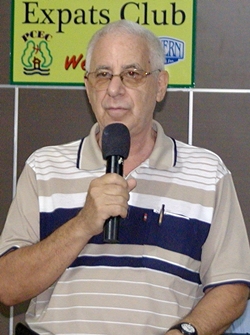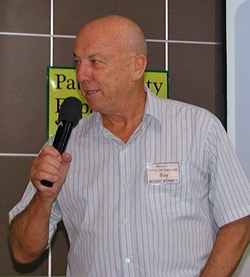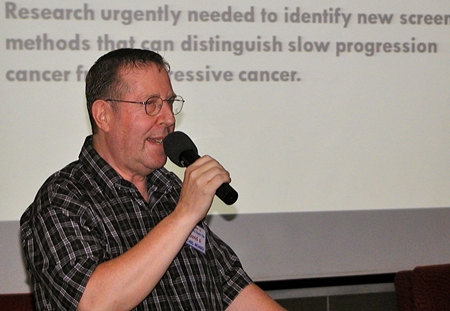Are men being over-tested and over-treated for prostate cancer? This was the topic presented by Club member David Garmaise at the Sunday, June 30 meeting of the Pattaya City Expats Club. He pointed out that in May 2012, following several studies on the use of the PSA test for prostate cancer screening; one U.S. agency stated: “The U.S. Preventive Services Task Force recommends against PSA-based screening for prostate cancer.”
David said that the position of the Task Force is and remains controversial. Further, the purpose of his presentation was to explore the reasons for the position they took. David explained that although he is a prostate cancer survivor, he is not a medical doctor; and that any opinions he provided were not medical opinions and the issues of over-testing and over-treating had to be looked at together.
 Master of Ceremonies Richard Silverberg opens the June 30th meeting of the Pattaya City Expats Club by inviting visitors and guests to introduce themselves, prior to calling on the speaker. Jerry Dean assists with the AV presentation.
Master of Ceremonies Richard Silverberg opens the June 30th meeting of the Pattaya City Expats Club by inviting visitors and guests to introduce themselves, prior to calling on the speaker. Jerry Dean assists with the AV presentation.
David presented some general facts about prostate cancer, including PSA results as well as the Gleason score provided as a result of biopsy that may indicate an aggressive form of the cancer; PSA level of 10 or greater or Gleason score of 8 or more. Although the Gleason score is considered to be a more reliable indicator of the cancer’s aggressiveness than the PSA test, it also has limitations as a reliable indicator. Additionally, he noted that studies show the lifetime risk of dying from prostate cancer is estimated to be 2.8%.
David explained that the most commonly used treatments for prostate cancer are surgery to remove the prostate and radiation. Some people choose active surveillance, also referred to as “observation” or “watch and wait.” Further, those who argue that we are over-treating prostate cancer will point to the analysis of the results of several studies. For example, the Task Force said that 90% of the men diagnosed with prostate cancer choose to have surgery or radiation; and that two-thirds of these men have low grade cancer that probably does not need to be treated.
David presented data from the PIVOT study in the U.S. which enrolled 732 patients, half of whom had decided to have surgery; the other half chose active surveillance. After observing the patients for 10 years, the researchers discovered that there was very little difference in outcomes. They predicted that 1.6% of men who choose surgery will die from prostate cancer in 20 years, compared with 2.8% of men who choose observation; and that the average life extension for men who choose surgery will be just 1.8 months.
Those who say that we are over-treating also point to data on the risk of adverse events from surgery. For example, the Task Force said that for each 1,000 men who choose surgery: five die within one month of surgery; 10 to 70 have serious complications; and 200 to 300 have long-term adverse effects. One researcher from the PIVOT study concluded: “There is probably a benefit [from surgery] for 1 or 2 patients out of 100, and these men derive a lot of benefit, and there is probably no benefit for anyone else.”
 Open Forum MC Roy Albiston invites members & guests to asks the many questions about life & living in the land of smiles, such as how to get a drivers licence or get a car registered, or ‘can falangs own land?’ The club website is also an excellent source of information, and can be found at www.pattayacityexpatsclub.com. One can also sign for the newsletter on the site, so you will be informed on Thursday or Friday what the topic will be for the following Sunday, and also of upcoming events in Pattaya.
Open Forum MC Roy Albiston invites members & guests to asks the many questions about life & living in the land of smiles, such as how to get a drivers licence or get a car registered, or ‘can falangs own land?’ The club website is also an excellent source of information, and can be found at www.pattayacityexpatsclub.com. One can also sign for the newsletter on the site, so you will be informed on Thursday or Friday what the topic will be for the following Sunday, and also of upcoming events in Pattaya.
So, are we over-treating? David felt that it depends how you look at it. At the society level, if you have to treat 100 people to save one or two lives, and if the complications from surgery can be significant, he said it does look like we are over-treating. However, at the individual level, the natural response of most men who have been diagnosed with prostate cancer and who look at this data is to say: “Maybe I’m that one person in 100 that needs to be treated!”
Are we over-testing? David said that three main arguments are advanced in support of this thesis: (1) the PSA test often produces false positives, which can have negative psychological effects and which usually leads to more (unnecessary) testing; (2) a high PSA level usually leads to a biopsy, and the biopsy itself can cause complications (for example, the risk of infection is at least 2%); and a diagnosis of cancer usually leads to over-treatment for most men.
The Task Force concluded: “Existing studies adequately demonstrate that the reduction in prostate cancer mortality from PSA testing after 10 to 14 years is, at most, very small, even for men aged 55 – 69.” Researchers from a European study concluded: “For every life saved, 1,410 people had to have a PSA test and 48 people were put through unnecessary treatment.” So, are we over-testing? David said that, again, it depends on how you look at it. As a society, if we test over 1,400 people and treat 48 to save one life, it looks like we are over-testing. However, David believes that the decision of whether not to take the PSA test has to be an individual one. David added that he found the argument that testing automatically leads to over-treatment to be patronising. His opinion was that the researchers are saying that patients who are diagnosed with prostate cancer cannot be trusted to make intelligent decisions about treatment.
David said he found two major flaws in the arguments for not testing. First, if you don’t do the PSA test, you don’t know there might be a problem. Second, if you don’t do the biopsy, you have no idea how aggressive your cancer might be.
 Speaker for June 30th was board member David Garmaise. The topic was the controversial subject of prostate cancer, and an attempt to unravel the often conflicting information about it, from the perspective of a patient. A number of other members shared in some detail their experiences, and a prostate cancer interest group was formed to share further information on the topic.
Speaker for June 30th was board member David Garmaise. The topic was the controversial subject of prostate cancer, and an attempt to unravel the often conflicting information about it, from the perspective of a patient. A number of other members shared in some detail their experiences, and a prostate cancer interest group was formed to share further information on the topic.
David concluded by saying that not all medical associations have taken as “extreme” a position as the US Task Force. For example, the American College of Physicians still recommends that doctors screen men aged 50 – 69. And the U.K. government says that men “are entitled to make an informed choice about whether or not they should have a PSA test, based on balanced information about its pros and cons.”




